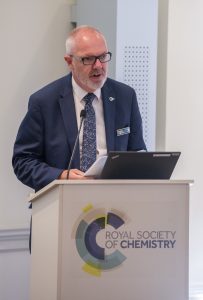Editorial
RSC chief executive, Robert Parker looks back on the 7th EuChemS Chemistry Congress

We are very proud to have played host to so many members of our international chemistry community in the UK this summer and there are some impressive numbers from our packed programme. We welcomed more than 1,500 delegates from 60 countries to Liverpool – a city with a history, present and future, rich in chemistry. The five-day programme followed a theme of “Molecular frontiers and global challenges” and included eight plenary lectures, more than 450 talks across nine parallel sessions, as well as networking opportunities and poster sessions. Memorably, the social programme also included hundreds of chemists dancing to the music of Liverpool’s most famous exports, with an appearance from the excellent Bootleg Beatles!
When EuChemS President, Professor Pilar Goya Laza, welcomed delegates to the congress, she rightly thanked the organising committees, chaired by Bengt Norden and Tom Brown. Pilar outlined the importance of science making connections across borders, saying: “Through EuChemS, we will continue to bring together your voice, and the voices from over thirty different countries into one common language, and to communicate our shared belief in chemistry, in science, in Europe.”
The congress also included the presentation of the EuChemS European Chemistry Gold Medal to Nobel laureate Professor Ben Feringa. Ben was one of our plenary speakers in Liverpool, as well as in Seville in 2016, shortly before receiving his Nobel Prize. This year, Frances Arnold was plenary speaker in Liverpool and shortly after received the Nobel Prize, just the fifth woman to receive the prize.
A theme of inspiring the next generation continued throughout the week, with members of the European Young Chemists Network (EYCN), who ran sessions for fellow early career chemists. One of their organisers, Fernando Gomollón Bel, said: “The mood has been really optimistic because people believe in the future of chemistry, because chemistry is actually the central science – it’s found in materials, it’s found in medicine – and a lot of the talks so far have focused on trying to find a positive attitude towards chemistry and finding the right mentors that can inspire great stories and great chemistry”.
In his closing speech, Royal Society of Chemistry past president, Professor Sir John Holman, reminded us why chemistry is, and must always remain, collaborative and international. “Chemistry must be bigger than a single country, bigger than a single strand of research, or a single sub-discipline. We must cross borders, not set them up. We must pass by frontiers and help to solve the challenges that affect all of us.”
During the congress, we published a number of inspirational interviews and highlights videos on our YouTube channel – you’ll find those at www.youtube.com/user/wwwRSCorg.
Robert Parker
CEO, Royal Society of Chemistry
Focus
Horizon Europe – negotiations in full swing
Negotiations surrounding the future EU research framework programme, Horizon Europe, are in full swing. In August, EuChemS published a Position Paper emphasising the need for excellence to remain the core pillar of the future programme. EuChemS also called for a more convincing and ambitious budget than currently proposed by the European Commission, as well as budget increases for the European Research Council and the Marie Skłodowska-Curie Actions – both of which have over the years demonstrated highly successful results, but which are unable to fully support the vast amount of excellent proposals submitted. Finally, EuChemS has emphasised that science knows no borders, and that countries that have in the past participated in EU framework programmes, should be able to do so in Horizon Europe. Different visions are appearing in negotiations however – especially over whether the principle of excellence should make way to geographical distribution of funds in order to address the research and innovation divide in Europe. Shifting Horizon Europe towards a cohesion-like funding programme risks damaging the quality of European science in the long term and may not fix the divide.



You must be logged in to post a comment.